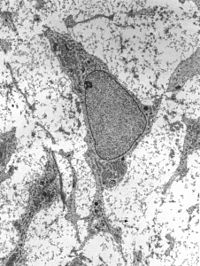
Derivation of Neural Stem Cells from the Developing and Adult Human Brain.
Sign Up to like & getrecommendations! Published in 2018 at "Results and problems in cell differentiation"
DOI: 10.1007/978-3-319-93485-3_1
Abstract: Neural stem cells isolated from the developing and adult brain are an ideal source of cells for use in clinical applications such as cell replacement therapy. The clear advantage of these cells over the more… read more here.
Keywords: developing adult; brain; stem; stem cells ... See more keywords

O-GlcNAc cycling in the developing, adult and geriatric brain
Sign Up to like & getrecommendations! Published in 2018 at "Journal of Bioenergetics and Biomembranes"
DOI: 10.1007/s10863-018-9760-1
Abstract: Hundreds of proteins in the nervous system are modified by the monosaccharide O-GlcNAc. A single protein is often O-GlcNAcylated on several amino acids and the modification of a single site can play a crucial role… read more here.
Keywords: glcnac; geriatric brain; adult geriatric; developing adult ... See more keywords

Dicer Deficiency Differentially Impacts Microglia of the Developing and Adult Brain
Sign Up to like & getrecommendations! Published in 2017 at "Immunity"
DOI: 10.1016/j.immuni.2017.05.003
Abstract: Summary Microglia seed the embryonic neuro‐epithelium, expand and actively sculpt neuronal circuits in the developing central nervous system, but eventually adopt relative quiescence and ramified morphology in the adult. Here, we probed the impact of… read more here.
Keywords: adult; dicer; developing adult; microglia developing ... See more keywords

Lipoprotein(a) in Youth and Prediction of Major Cardiovascular Outcomes in Adulthood
Sign Up to like & getrecommendations! Published in 2022 at "Circulation"
DOI: 10.1161/circulationaha.122.060667
Abstract: Background: Elevated lipoprotein(a) [Lp(a)] is a common risk factor for cardiovascular disease outcomes with unknown mechanisms. We examined its potential role in identifying youths who are at increased risk of developing adult atherosclerotic cardiovascular disease… read more here.
Keywords: youth; risk developing; adult; developing adult ... See more keywords

Analysis of the expression pattern of the schizophrenia-risk and intellectual disability gene TCF4 in the developing and adult brain suggests a role in development and plasticity of cortical and hippocampal neurons
Sign Up to like & getrecommendations! Published in 2018 at "Molecular Autism"
DOI: 10.1186/s13229-018-0200-1
Abstract: BackgroundHaploinsufficiency of the class I bHLH transcription factor TCF4 causes Pitt-Hopkins syndrome (PTHS), a severe neurodevelopmental disorder, while common variants in the TCF4 gene have been identified as susceptibility factors for schizophrenia. It remains largely… read more here.
Keywords: developing adult; expression; expression pattern; brain ... See more keywords